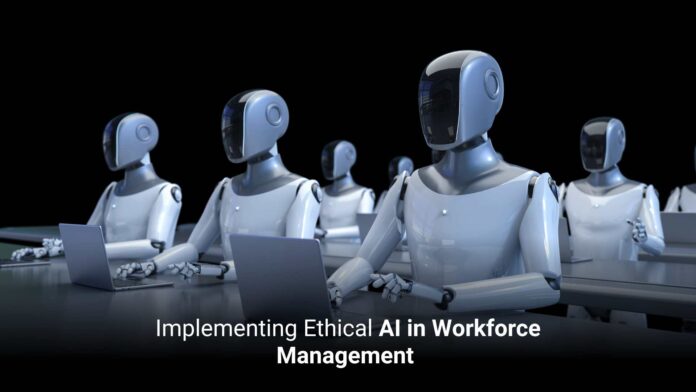An organization rolls out an AI workforce management system designed to enhance employee engagement. At first, everything seems efficient, but soon employees begin questioning the fairness of automated decisions. Implementing AI in workforce management is all about trust, transparency, and responsibility.
In workforce management, Ethical AI helps make decisions without compromising fairness. For instance, an AI scheduling tool can allocate shifts based on availability, skills, and workload history. It leads to equity and inclusion across the organization.
This article talks about why you need to implement ethical AI in workforce management.
How to Implement Ethical AI in Workforce Management
Here’s how to implement Ethical AI across workforce functions.
- Establish Governance Frameworks
Before implementing AI, you must define policies that set ethical standards for data collection, model usage, and decision-making.
Example: A services firm introduced an AI ethics board to oversee algorithms used in workforce analytics. The board evaluated bias, explainability, and compliance.
Impact: It aligned AI decisions with company values and global compliance standards.
- Ensure Data Consent
Ethical AI starts with responsible data handling. Employees must know what data is collected, why, and how it’s used.
Example: An IT services provider using AI attendance and productivity monitoring made dashboards accessible to employees, showing how data influenced workload planning.
Impact: Transparency built employee trust and minimized resistance toward AI adoption.
- Mitigate Algorithm Bias
AI systems reinforce bias if trained on unstructured data. Continuous auditing ensures that it does not happen.
Example: A SaaS company employing AI for performance reviews discovered that its model favored employees from specific departments. Retraining the AI on diverse data eliminated the bias.
Impact: This led to equitable recognition and promotion of decisions across teams.
- Maintain Human Oversight in AI Decisions
Ethical AI should augment human judgment. Workforce decisions should always include human decision-making.
Example: A logistics firm uses AI to recommend that team managers handle shift allocations, but final approvals are required.
Impact: This hybrid approach balances efficiency with empathy, enhancing workforce satisfaction.
- Align AI Models with ESG Goals
AI in workforce management should reinforce business ethics and sustainability commitments.
Example: A manufacturing company linked its AI workforce management system to ESG objectives by ensuring gender-neutral hiring algorithms.
Impact: The initiative not only improved workforce diversity but also enhanced brand reputation.
- Build Employee Awareness and AI Literacy
Helping employees with AI literacy helps them understand the system’s intent and reduces fear of automation.
Example: A consulting enterprise conducted AI ethics workshops for managers and HR to explain how the predictive workforce tool functions.
Impact: This transparency increased adoption rates and collaboration between teams.
- Monitor and Audit AI Systems
Regular audits in Ethical AI implementation ensure systems remain compliant, fair, and relevant.
Example: A cloud-based firm built a quarterly audit process to assess AI-driven decisions.
Impact: It ensures accountability and reduces risks associated with algorithm errors.
Benefits of Ethical AI in Workforce Management
Here are the key benefits of implementing Ethical AI in workforce management.
- Builds Trust Across the Workforce
When employees understand how AI makes decisions, it builds confidence in the system.
Example: A services firm deployed AI scheduling tools but provided employees with visibility into how shift priorities were decided.
Impact: It reduced workplace disputes and increased satisfaction with the decisions.
- Improves Compliance and Reduces Risks
Ethical AI helps organizations comply with labor laws, data protection acts, and global governance frameworks.
Example: An IT outsourcing firm uses AI models built on ethical compliance principles aligned with regulations.
Impact: It reduced data misuse, legal disputes, and non-compliance penalties, while reinforcing the reputation.
- Drives Employee Engagement and Retention
Employees will stay in an organization that uses technology to empower. Ethical AI fosters a culture of transparency, boosting engagement.
Example: A logistics company used Ethical AI to predict workload stress and suggest adjustments.
Impact: Employee satisfaction rose, and attrition rates dropped significantly.
- Enables Responsible Automation
AI automation can boost efficiency, but Ethical AI ensures that it supports, not replaces, existing processes.
Example: A manufacturing firm implemented AI workforce optimization tools that automated tasks while keeping human oversight for final approvals.
Impact: Productivity improved, while employees trusted the AI decisions.
- Strengthens Employer Brand and ESG
In a purpose-driven era, Ethical AI contributes to sustainability goals. Organizations that implement responsible AI are perceived as inclusive.
Example: A consulting firm highlighted its Ethical AI framework in its ESG report, showcasing fair workforce management practices.
Impact: It attracted socially responsible clients and top talent, reinforcing its ethical employer brand.
- Facilitates Data for Workforce Decisions
Ethical AI provides leaders with insights for workforce planning without compromising privacy or fairness.
Example: A cloud enterprise used Ethical AI to forecast staffing needs across regions.
Impact: This improved decision-making accuracy while upholding strong data privacy standards.
- Enhances Decision Accuracy While Reducing Bias
Ethical AI systems analyze diverse datasets to make objective decisions, provided they’re implemented responsibly.
Example: A recruitment solutions provider implemented an Ethical AI to assess candidates based on skills and experience.
Impact: The organization achieved improvement in diversity of metrics and a reduction in hiring bias.
Conclusion
Implementing Ethical AI helps in brand reputation and compliance. Organizations that adopt Ethical AI demonstrate a commitment to responsible innovation and attracting top talent. Regular audits and ongoing education for employees further ensure that AI systems remain transparent and aligned with evolving regulations.
Begin by auditing current processes, establishing governance frameworks, and training teams on AI literacy. By implementing these strategies, you build a workforce that is prepared for the demands of tomorrow.
Paramita Patra is a content writer and strategist with over five years of experience in crafting articles, social media, and thought leadership content. Before content, she spent five years across BFSI and marketing agencies, giving her a blend of industry knowledge and audience-centric storytelling.
When she’s not researching market trends , you’ll find her travelling or reading a good book with strong coffee. She believes the best insights often come from stepping out, whether that’s 10,000 kilometers away or between the pages of a novel.







